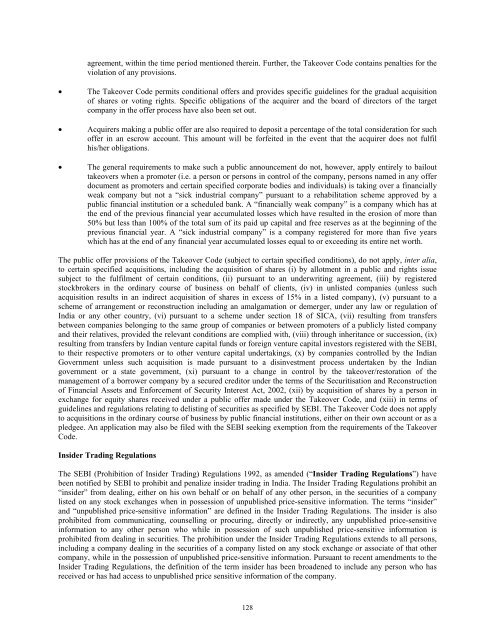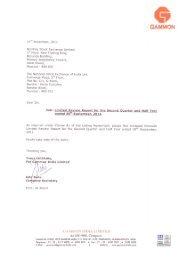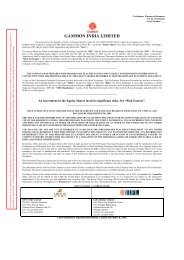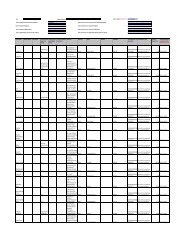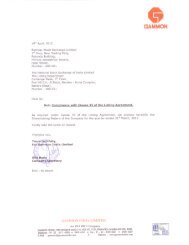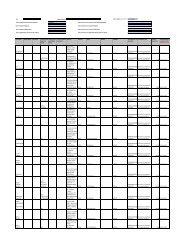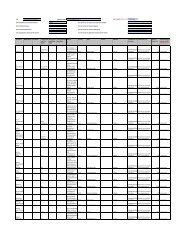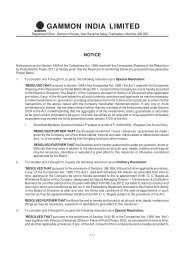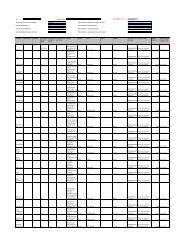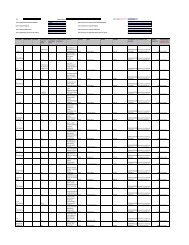GAMMON INDIA LIMITED
GAMMON INDIA LIMITED
GAMMON INDIA LIMITED
Create successful ePaper yourself
Turn your PDF publications into a flip-book with our unique Google optimized e-Paper software.
agreement, within the time period mentioned therein. Further, the Takeover Code contains penalties for the<br />
violation of any provisions.<br />
The Takeover Code permits conditional offers and provides specific guidelines for the gradual acquisition<br />
of shares or voting rights. Specific obligations of the acquirer and the board of directors of the target<br />
company in the offer process have also been set out.<br />
Acquirers making a public offer are also required to deposit a percentage of the total consideration for such<br />
offer in an escrow account. This amount will be forfeited in the event that the acquirer does not fulfil<br />
his/her obligations.<br />
The general requirements to make such a public announcement do not, however, apply entirely to bailout<br />
takeovers when a promoter (i.e. a person or persons in control of the company, persons named in any offer<br />
document as promoters and certain specified corporate bodies and individuals) is taking over a financially<br />
weak company but not a “sick industrial company” pursuant to a rehabilitation scheme approved by a<br />
public financial institution or a scheduled bank. A “financially weak company” is a company which has at<br />
the end of the previous financial year accumulated losses which have resulted in the erosion of more than<br />
50% but less than 100% of the total sum of its paid up capital and free reserves as at the beginning of the<br />
previous financial year. A “sick industrial company” is a company registered for more than five years<br />
which has at the end of any financial year accumulated losses equal to or exceeding its entire net worth.<br />
The public offer provisions of the Takeover Code (subject to certain specified conditions), do not apply, inter alia,<br />
to certain specified acquisitions, including the acquisition of shares (i) by allotment in a public and rights issue<br />
subject to the fulfilment of certain conditions, (ii) pursuant to an underwriting agreement, (iii) by registered<br />
stockbrokers in the ordinary course of business on behalf of clients, (iv) in unlisted companies (unless such<br />
acquisition results in an indirect acquisition of shares in excess of 15% in a listed company), (v) pursuant to a<br />
scheme of arrangement or reconstruction including an amalgamation or demerger, under any law or regulation of<br />
India or any other country, (vi) pursuant to a scheme under section 18 of SICA, (vii) resulting from transfers<br />
between companies belonging to the same group of companies or between promoters of a publicly listed company<br />
and their relatives, provided the relevant conditions are complied with, (viii) through inheritance or succession, (ix)<br />
resulting from transfers by Indian venture capital funds or foreign venture capital investors registered with the SEBI,<br />
to their respective promoters or to other venture capital undertakings, (x) by companies controlled by the Indian<br />
Government unless such acquisition is made pursuant to a disinvestment process undertaken by the Indian<br />
government or a state government, (xi) pursuant to a change in control by the takeover/restoration of the<br />
management of a borrower company by a secured creditor under the terms of the Securitisation and Reconstruction<br />
of Financial Assets and Enforcement of Security Interest Act, 2002, (xii) by acquisition of shares by a person in<br />
exchange for equity shares received under a public offer made under the Takeover Code, and (xiii) in terms of<br />
guidelines and regulations relating to delisting of securities as specified by SEBI. The Takeover Code does not apply<br />
to acquisitions in the ordinary course of business by public financial institutions, either on their own account or as a<br />
pledgee. An application may also be filed with the SEBI seeking exemption from the requirements of the Takeover<br />
Code.<br />
Insider Trading Regulations<br />
The SEBI (Prohibition of Insider Trading) Regulations 1992, as amended (“Insider Trading Regulations”) have<br />
been notified by SEBI to prohibit and penalize insider trading in India. The Insider Trading Regulations prohibit an<br />
“insider” from dealing, either on his own behalf or on behalf of any other person, in the securities of a company<br />
listed on any stock exchanges when in possession of unpublished price-sensitive information. The terms “insider”<br />
and “unpublished price-sensitive information” are defined in the Insider Trading Regulations. The insider is also<br />
prohibited from communicating, counselling or procuring, directly or indirectly, any unpublished price-sensitive<br />
information to any other person who while in possession of such unpublished price-sensitive information is<br />
prohibited from dealing in securities. The prohibition under the Insider Trading Regulations extends to all persons,<br />
including a company dealing in the securities of a company listed on any stock exchange or associate of that other<br />
company, while in the possession of unpublished price-sensitive information. Pursuant to recent amendments to the<br />
Insider Trading Regulations, the definition of the term insider has been broadened to include any person who has<br />
received or has had access to unpublished price sensitive information of the company.<br />
128


